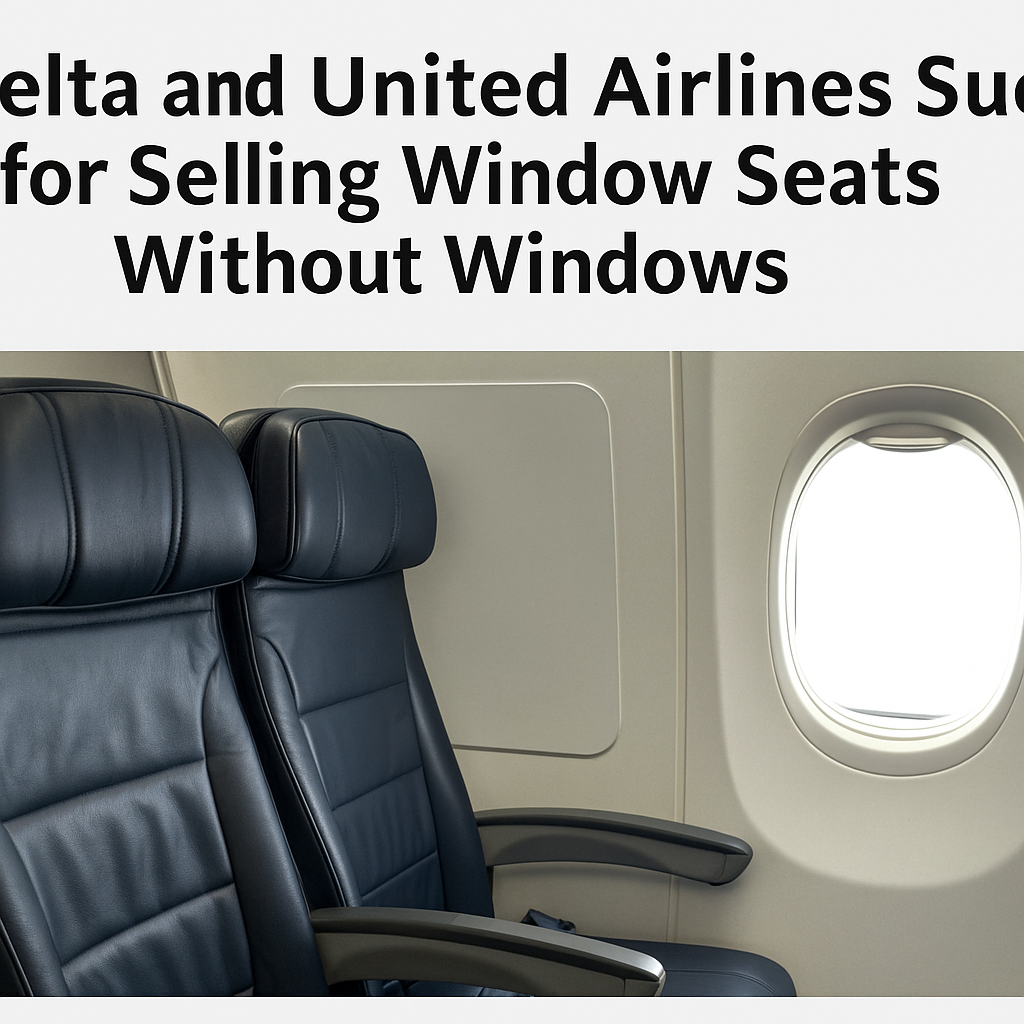Delta and United Airlines sued for selling window seats without windows. This headline stirred outrage across the travel world. Air travelers spend extra money for specific seats. They want the comfort of a clear sky view. They expect sunlight, scenery, and even stress relief. Instead, many paid for blank plastic walls.
The lawsuits filed in August 2025 accuse both airlines of deception. They claim Delta and United charged premiums for something they did not deliver. Passengers call this a betrayal of trust. Critics see it as another example of creeping airline fees. Courts now decide if this practice violates consumer rights.
This article explains every detail of the lawsuits. It covers passenger stories, engineering reasons, legal claims, industry reactions, and what travelers can do next. The issue is simple: transparency. The stakes, however, could change how airlines sell seats forever.
Legal Storm Begins
The lawsuits reflect years of irritation building among travelers. They did not surface suddenly. Passenger complaints spread on forums, blogs, and review sites. For a long time, airlines ignored them. Now, courts will decide.
Two Class-Action Lawsuits
Two separate lawsuits launched within days of each other. One case targets Delta in Brooklyn federal court. Another case targets United in San Francisco federal court. Each one seeks class certification. If approved, they could represent more than a million passengers per airline.
The legal filings accuse both carriers of deceptive advertising. They argue that customers relied on false maps. They emphasize that airlines charged more for seats labeled as window seats. Yet in reality, these were “windowless window seats.”
Both lawsuits pursue significant damages. They also demand systemic changes in how seat maps work. The cases are not about one passenger. They represent widespread consumer frustration.
Core Allegations
The core allegation is clear. Airlines sold window seats without windows. Passengers believed they were purchasing seats with views. Instead, they paid for wall space. The deception occurred at the moment of booking.
Seat maps showed windows where none existed. Internal aircraft design prevented actual openings. Airlines knew this but failed to disclose it. Plaintiffs argue that this omission was intentional. It allowed them to profit from higher seat fees.
The claim extends beyond simple refunds. Plaintiffs say this practice created an unfair system. It made customers think premium seats offered unique benefits. In reality, many offered less than standard seats.
Airlines Stay Silent
Delta and United remain mostly silent. Their official responses cite ongoing litigation. Legal teams advise against public statements. That silence only angers passengers further. Many interpret it as arrogance.
Public relations experts warn that silence carries risks. Trust erodes quickly when companies avoid accountability. Silence may save them in court. It may also cost them in loyalty. Travelers now watch closely for any official apology or corrective action.
Anatomy of a “Windowless Window Seat”
To understand the issue, you need to look at airplane design. The missing windows are not accidents. They are intentional parts of engineering.
Aircraft Design Constraints
Aircraft engineers must fit air-conditioning ducts, electrical wiring, and structural supports into the fuselage. In some rows, these systems overlap the typical window spaces. Boeing 737s, Boeing 757s, and Airbus A321s commonly have these blank panels.
Instead of windows, passengers in those rows sit against smooth walls. No natural light enters. No outside scenery appears. For many, it feels claustrophobic. For some, it creates anxiety. The design saves space and weight but sacrifices passenger experience.
Airlines cannot easily change these layouts. The systems are vital to flight safety. But airlines can control how they present those seats during booking. That presentation is where lawsuits focus.
Seat Maps and Disclosure Practices
Seat maps are powerful tools. Customers select seats based on icons, colors, and placement. A shaded circle suggests a window. A symbol hints at extra legroom. Travelers rely on these maps.
Alaska Airlines and American Airlines disclose seats with no windows. They add notes like “no window.” This alerts customers before purchase.
Delta and United did not. Their maps show windows where walls exist. Passengers only discover the truth after boarding. That lack of disclosure stands at the center of these lawsuits.
Stories from Passengers
Stories from actual passengers illustrate the problem vividly. They reveal how disappointment translates into anger and legal action.
Nicholas Meyer vs. Delta
Nicholas Meyer booked a Delta flight on August 5, 2025. He deliberately chose a window seat for a four-hour trip. The seat cost extra. He imagined enjoying sky views.
Instead, he sat next to a wall. No light, no view, no relief from cabin confinement. He described feeling cheated and trapped. His lawsuit says Delta misled him during booking. Meyer’s experience captures the frustration of countless passengers. It highlights the emotional side of the issue. For many, the view is not optional. It is essential.
Aviva Copaken and Marc Brenman vs. United
Aviva Copaken purchased three “window seats” on United flights. They cost between $45.99 and $169.99 each. She found no windows in any of them. United refunded two fees but refused the third. That denial drove her to join the lawsuit.
Marc Brenman used points for his window seat. He boarded only to discover a blank wall. United offered him 7,500 miles in compensation. He considered that insulting. He felt the airline treated his loyalty cheaply. These stories show the pattern is not rare. It affects passengers across multiple flights and routes.
Social Media Echo
Social media amplified these frustrations. Reddit threads, TikTok videos, and X posts spread rapidly. Flyers uploaded photos of their wall seats. Captions expressed disbelief and sarcasm.
One viral post read: “There is nothing worse than choosing a window seat and discovering none.” Thousands shared and commented on it. Many added personal stories of similar experiences. The online echo chamber intensified pressure. What began as isolated complaints turned into a public narrative. That narrative now shapes courtroom debates.
The Consumer Harm
The lawsuits emphasize harm beyond money. They focus on emotional, physical, and psychological effects too.
Why Window Seats Matter
Window seats serve many purposes. For anxious travelers, the view calms nerves. Watching clouds reduces fear of turbulence. For children, the scenery distracts and entertains. Parents often rely on windows to keep kids occupied.
Light from windows helps passengers feel less confined. It reduces claustrophobia. It lowers stress and even helps travelers cope with motion sickness. When those windows vanish, benefits vanish too. Passengers lose comfort they expected and paid for. That loss feels more significant than airlines admit.
Hidden Premiums
The harm extends to wallets. Airlines profit heavily from seat selection fees. United charges $50 to $100 for window seats. Delta charges $40 or more just for access, plus $30 or more for seat choice.
Passengers spent these amounts expecting views. Instead, they received blank panels. Plaintiffs call this unfair enrichment. They argue airlines-built revenue streams on misleading seat maps. The harm combines financial and psychological costs. That combination strengthens the lawsuits.
Legal Claims and Remedies Sought
The lawsuits highlight specific legal theories. They seek not only compensation but also systemic change.
Deceptive Advertising & Breach of Contract
Plaintiffs accuse Delta and United of deceptive advertising. They say airlines knowingly displayed false information. Customers relied on that information when paying fees. They also accuse airlines of breaching contracts. Tickets and receipts promised specific benefits. Seats failed to deliver those benefits. That breach supports legal claims for damages.
Class Certification and Damages
The class may cover over one million passengers per airline. Damages could reach tens of millions of dollars. Plaintiffs seek refunds, punitive damages, and interest. Lawyers argue the harm was systematic, not isolated. That strengthens the case for class certification. A certified class gives passengers collective power.
Transparency Orders
The lawsuits also seek injunctive relief. Plaintiffs want courts to require clear disclosure of no-window seats. They argue airlines must match industry peers. If courts grant this relief, seat maps could change permanently. That would mark a major victory for transparency.
Broader Industry Impact
The lawsuits could reshape the airline industry. They extend beyond two companies.
Precedent for Seat-Selling Practices
If courts rule against Delta and United, all airlines may adjust practices. Disclosures could become mandatory. Failure to do so may invite lawsuits. This sets a precedent. Airlines profit from seat selection fees. Courts may limit those profits when deception exists.
Consumer Awareness and Trust
Trust sits at the heart of airline relationships. Hidden seat features destroy that trust. Passengers may now scrutinize maps more closely. They may demand clearer explanations during booking. Airlines that embrace transparency could win loyalty. Those that resist may lose it.
Next Steps and Timeline
Court cases follow slow paths. This process will stretch into months or years.
Court Proceedings
Courts will first decide class certification. They will then examine motions to dismiss. If cases survive, discovery begins. Lawyers will request documents, emails, and seat map records. Settlement talks may occur during this stage. Airlines may prefer settlements to avoid trials. Trials, however, remain possible. If they happen, verdicts could change airline policies nationwide.
Airline Reactions
Airlines have stayed quiet. Behind closed doors, they likely weigh costs of settlements against risks of trials. Public analysts expect eventual settlements. They note airlines want to avoid negative publicity during trials. Consumers, however, demand more than money. They want admissions of wrongdoing and policy changes.
What Passengers Can Do
Passengers can take action even before courts rule. These steps offer protection and potential compensation.
- Check maps carefully: Use third-party sites like SeatGuru. Compare airline maps to independent reviews. Many community forums share exact rows without windows. This research prevents surprises.
- Take screenshots: Document booking screens. Save seat maps showing windows. Screenshots create proof if disputes arise. Airlines cannot deny what was shown during purchase.
- Request refunds: If you discover a missing window, file a claim immediately. Airlines often provide miles, vouchers, or partial refunds. Persistence increases success.
- Track lawsuits: Monitor legal updates. If the class certifies, you may qualify for compensation. Class action settlements usually provide cash, vouchers, or miles.
Taking these steps empowers passengers. It turns frustration into action.
Window Seat Practices
| Airline | Disclosure Practice | Extra Cost Typical | Lawsuit Status |
|---|---|---|---|
| Delta | No disclosure of missing window | $30–$70 | Active case in NY |
| United | No disclosure of missing window | $45–$169 | Active case in CA |
| Alaska Airlines | Discloses “no window” seats | $25–$60 | No lawsuit |
| American Airlines | Discloses “no window” seats | $30–$70 | No lawsuit |
Conclusion
Delta and United Airlines sued for selling window seats without windows. The lawsuits expose the clash between corporate profits and consumer trust. They reveal how hidden seat features undermine loyalty and create resentment. They also show how even small design quirks carry legal risks when paired with misleading marketing.
Millions of passengers may join these class actions. If courts side with them, airlines could face major financial penalties. More importantly, they may be forced to adopt full transparency. Competitors already disclose missing windows. Delta and United may soon have no choice.
For travelers, the message is clear. Always double-check seats. Always document purchases. Demand honesty when paying for comfort. Courts may soon set a precedent that ensures airlines provide what they sell. Until then, passengers must stay vigilant.




